climate change
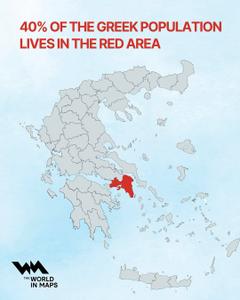
Maps / 19 weeks ago
40% of Greeks live in Attica, despite its small size
Although Attica represents only a small fraction of Greece's landmass, it houses nearly half the population. A whopping 40% of Greece’s population resides in Attica. The municipality spans an area of roughly 3,808 km², yet it accommodates approximately 3.8 million Greeks, out of the nation’s total population of around 10.48 million, according to The Greek Reporter.
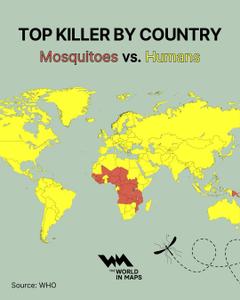
Environment / 26 weeks ago
Where mosquitoes are deadlier than people
Data from the World Health Organisation (WHO) presented in a map reveals that several countries, particularly across sub-Saharan Africa, face a grim reality of mosquitoes killing more people each year than armed violence and road traffic accidents combined. The data highlights the persistent and deadly burden of mosquito-borne diseases such as malaria, dengue, and yellow fever, which continue to claim hundreds of thousands of lives annually.
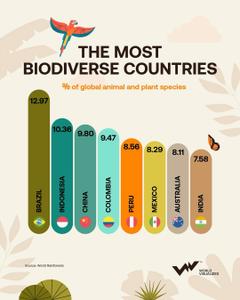
Environment / 27 weeks ago
Brazil tops list of the world's most biodiverse countries - Who else made the cut?
Brazil has secured its place as the most biodiverse country on Earth, home to nearly 13% of all known animal and plant species in a new biodiversity ranking released by World Population Review. The study, which analysed the share of global biodiversity by country, emphasises the critical role these nations play in preserving the planet’s ecosystems amid mounting threats from climate change, deforestation, and human expansion.
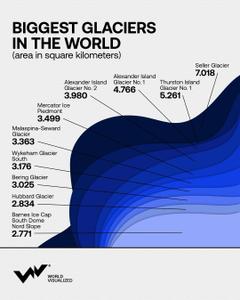
Environment / 30 weeks ago
Seller Glacier tops the charts as the largest in the world
Seller Glacier, located on the western edge of the Antarctic Peninsula, has been identified as the largest individual glacier in the world. Spanning an immense 7,018 square kilometres, this colossal ice body is slightly smaller than the Greek island of Crete. According to the infographic published by World Visualized, Seller Glacier surpasses other large glaciers such as Alexander Island Glacier No. 1 (4,766 sq. km), Thurston Island Glacier No. 1 (5,261 sq. km), and Alexander Island Glacier No. 2 (3,980 sq. km). These impressive measurements underscore Antarctica’s continued dominance in global glacier rankings.

Environment / 32 weeks ago
The global social protection gap: Why 2 billion people remain uncovered
According to the State of Social Protection Report 2025, a staggering 2 billion people across the globe remain uncovered or inadequately covered by any form of social protection—a stark reminder of the deep inequalities that still persist in the 21st century. Here’s a breakdown of the number of people without social protection by region:
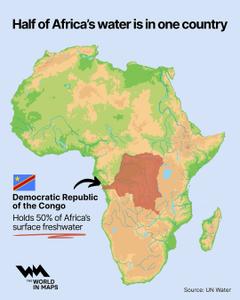
Environment / 32 weeks ago
Half of Africa’s water Is in one country — Here’s why it matters
According to UN Water and Winrock International, over 50% of Africa’s surface freshwater is concentrated in a single country — the Democratic Republic of the Congo (DRC). This extraordinary statistic highlights the DRC's immense natural wealth, centred around the Congo River Basin, which spans nearly 4 million square kilometres and fuels the continent’s second-longest river.
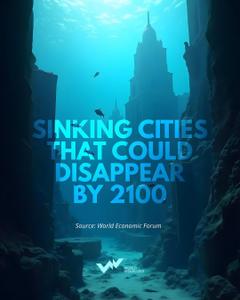
World / 42 weeks ago
Sinking cities and rising seas: A global crisis in the making
According to the World Economic Forum, some of the world’s most iconic cities face an existential threat as sinking land and rising sea levels converge, putting millions of people and critical infrastructure at risk. Coastal subsidence, exacerbated by over-extraction of groundwater, rapid urbanization, and climate change, has already forced governments to take drastic measures to protect their populations.
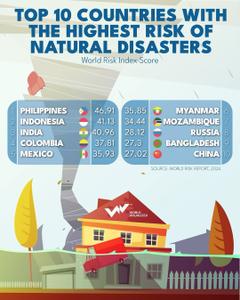
Environment / 43 weeks ago
Top 7 countries with the highest risk of natural disasters
As climate change crises intensify, it is only normal that natural disasters take a quantum leap. The World Risk Report 2024 has identified the top 10 countries most vulnerable to natural disasters, considering exposure, vulnerability, and susceptibility to extreme natural events like earthquakes, tsunamis, floods, and drought.
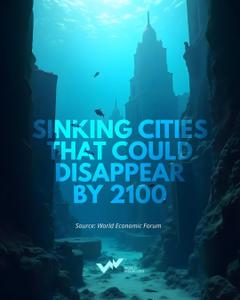
Environment / 47 weeks ago



